A reader asks, “I cannot decide between Nippon India Nifty 50 Bees ETF and UTI Nifty 50 Index Fund. The ETF has a total expense ratio of 0.05%, while the index fund’s TER is 0.2%. My friends tell me that ETF is bound to outperform the index fund over the long term and that choosing the ETF is a no-brainer. However, you repeatedly keep asking us to avoid ETFs. Can you please advise what to do?”
Your question reminds me of a line from the movie the Prestige. Hugh Jackman’s character says, “price is not an object.” David Bowie’s character (Nikola Tesla) responds, “Perhaps not, but have you considered the cost?” Yes, the price of investing in an ETF is much lower than that of an index fund, but what about the cost?
Unlike an index fund, an ETF trades like a stock (only high-net-worth individuals can buy and sell off the market). Therefore the NAV of an ETF is not relevant for tracking errors or returns. Only the market price matters.
The price of an ETF should ideally follow the NAV of an ETF. It can trade above/below the NAV for a few days, but an AMC-authorized participant reduces this difference via arbitrage.
However, when there is a supply-demand mismatch due to sudden positive or negative developments, the ETF price can significantly deviate from the NAV. The true cost of investing in an ETF is this price-NAV deviation.
Join 32,000+ readers and get free money management solutions delivered to your inbox! Subscribe to get posts via email! (Link takes you to our email sign-up form)

🔥Want to create a complete financial plan? Learn goal-based investing? Exclusive access to our DIY tools? Increase your income with your skills? Use this link to enjoy massive discounts on our robo-advisory tool & courses! 🔥
Very few ETFs in India consistently keep this NAV-price deviation in check. Very few ETFs in India see active trading. A large AUM or active trading are not prerequisites for low-NAV price deviations.
- Nippon India Nifty 50 Bees ETF is one of the best ETFs in the country. Source: ETF tracking error screener.
- UTI Nifty 50 Index Fund Direct Plan, Growth option is one of the best index funds in the country. Source: Index fund tracking error screener.
If we compare the price of Nifty Bees (not NAV, never NAV!) with UTI Nifty, which would come out on top? Many would expect the ETF to win, but that is not necessarily the case.
Suppose a fund’s expense ratio is the only reason for deviating from the index, the tracking error will be zero. This is because a fixed amount is deducted from the NAV of the ETF/ index fund, and therefore the relative volatility wrt the benchmark is zero.
The main sources of tracking error in an index are the AUM in and outflow, the impact costs of stocks (buy vs sell price deviation when sold in bulk) and corporate actions of stocks (dividends, splits etc.) This is particularly notorious in small AUM index funds. See: These five index funds beat their indices! Why you should avoid them!
An ETF also suffers from all these issues. In addition, it suffers from demand vs supply in its investors’ pool. Then there is the authorized participant who would only efficiently reduce price-NAV deviation when there is enough arbitrage incentive.
Therefore even before we compare the returns, it is clear that an index fund is the simpler choice, but would the higher expense ratio makes a difference to the returns?
The 1y, 3Y and 5Y rolling returns based on ETF price and index fund NAV are shown below. The date range is from Aug 2nd 2016, to Sep 30th 2022.
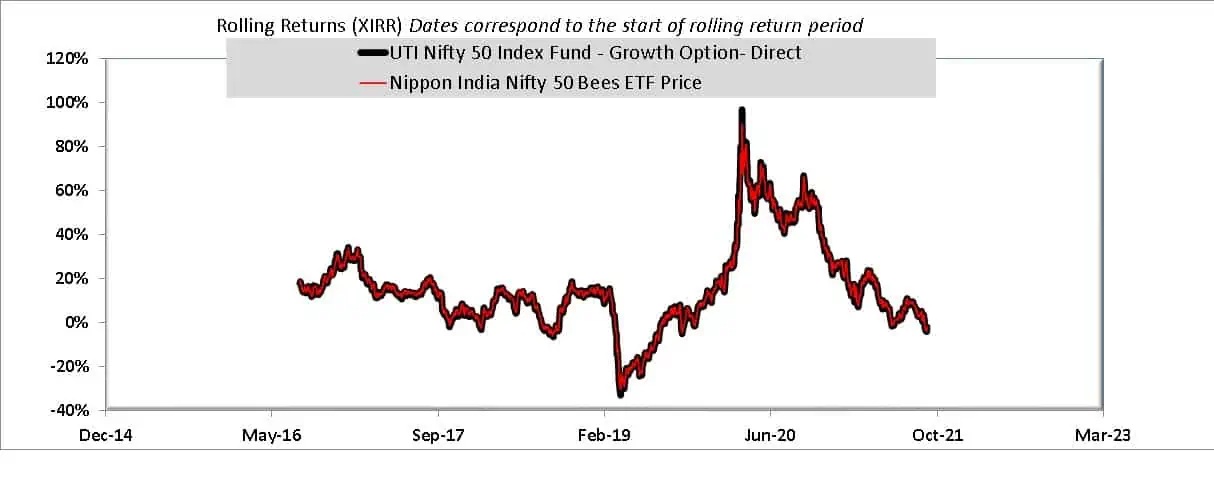
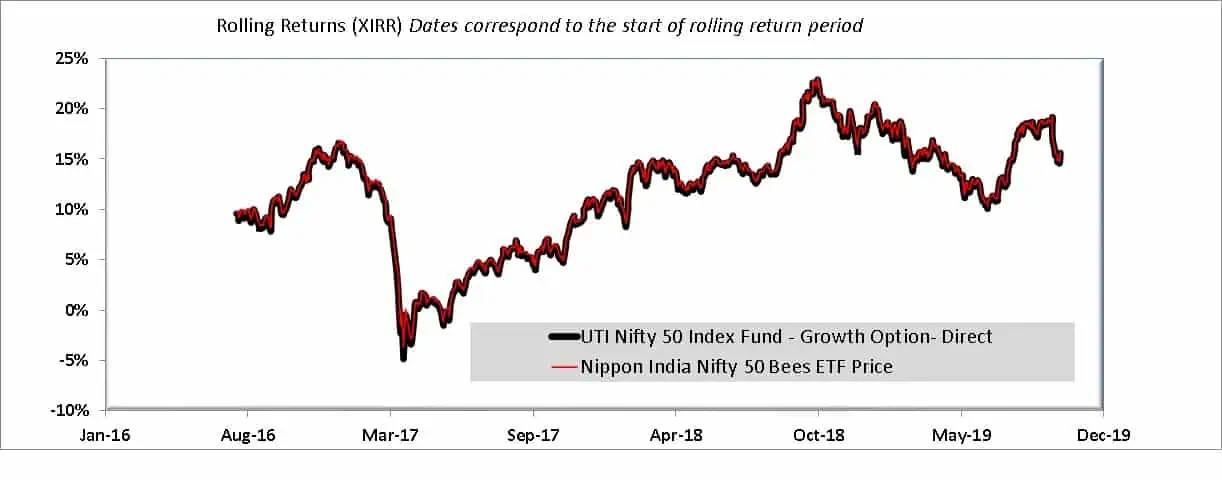
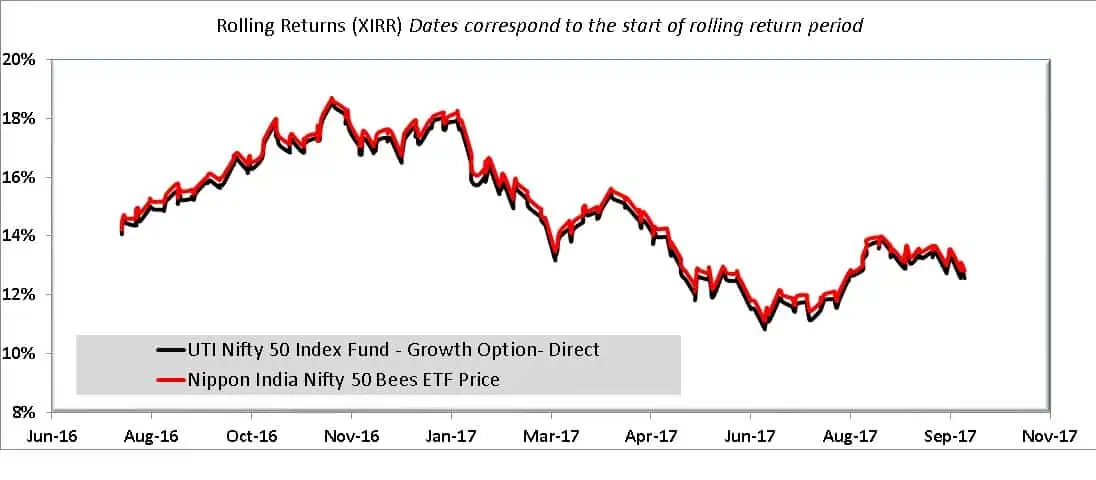
Over 1 and 3 years, the difference is negligible. Over five years, the ETF edges up with an average higher return of 0.24%. The median return is also the same (to two decimals). Please note that 5Y data is only over a year (see the range of the X-axis shrink from 1 to 5 years).
Assuming both passive funds are just as efficient in tracking the index (given their specific circumstances), the ETF has a small edge originating, possibly because of the higher expense ratio of the index fund. In May 2021, the UTI fund doubled its expense ratio from 0.1% in March 2021 to 0.2%. For its part, the ETF has had a steady expense ratio of 0.05% only from July 2019. Before that, it was as expensive as the UTI fund (0.1%); before May 2017, the ETF was more expensive.
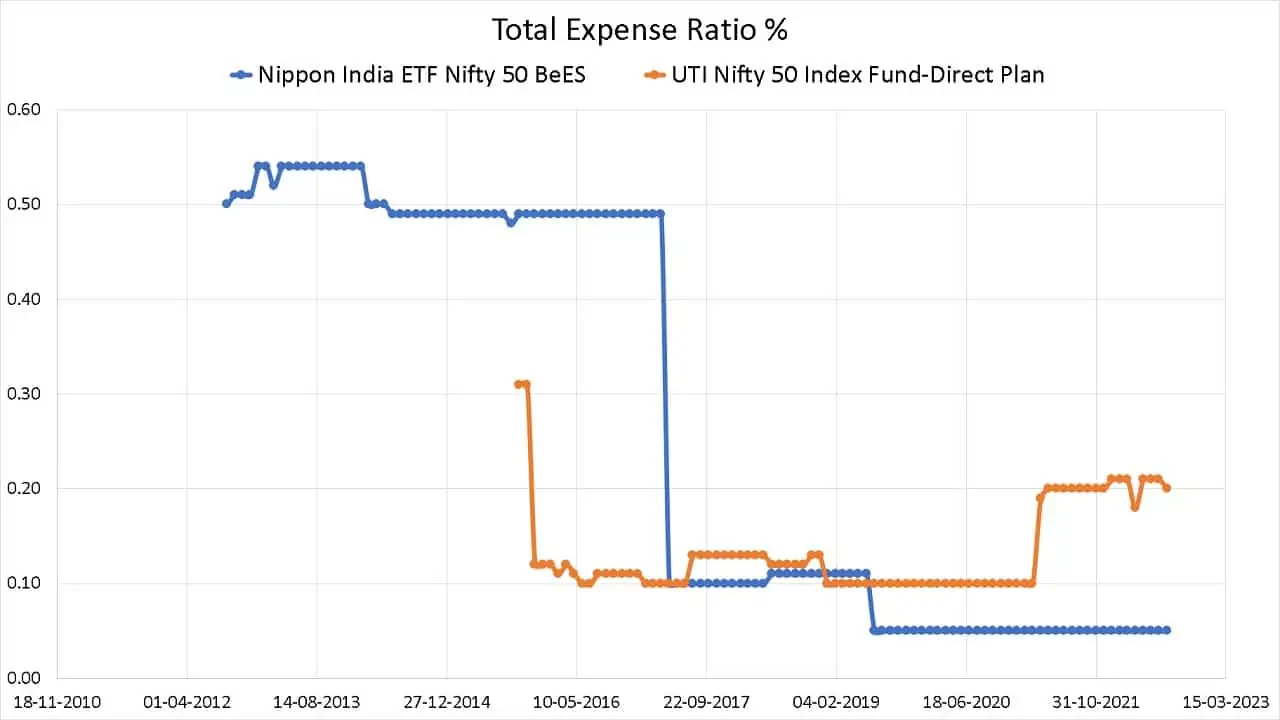
ETF or index fund, a simple thumb rule is when the expense ratio decreases, the fund house wants AUM and when it increases, the fund house wants to profit from the AUM increase and expects the inflow to be steady.
There is one catch to buying an ETF, though. A demat account is necessary, with its own one-time and recurring costs (brokerage and maintenance fee). So this would further narrow the gap in the five-year returns.
In summary, although Nippon India Nifty 50 Bees ETF is an excellent performer, the UTI Nifty 50 Index Fund is just as good and is the simpler choice for long-term investing. That said, experienced investors who can navigate the ETF price volatility can certainly consider Nifty Bees.

Use our Robo-advisory Tool to create a complete financial plan! ⇐More than 3,000 investors and advisors use this! Use the discount code: robo25 for a 20% discount. Plan your retirement (early, normal, before, and after), as well as non-recurring financial goals (such as child education) and recurring financial goals (like holidays and appliance purchases). The tool would help anyone aged 18 to 80 plan for their retirement, as well as six other non-recurring financial goals and four recurring financial goals, with a detailed cash flow summary.
🔥You can also avail massive discounts on our courses and the freefincal investor circle! 🔥& join our community of 8000+ users!
Track your mutual funds and stock investments with this Google Sheet!
We also publish monthly equity mutual funds, debt and hybrid mutual funds, index funds, and ETF screeners, as well as momentum and low-volatility stock screeners.
You can follow our articles on Google News

We have over 1,000 videos on YouTube!

Join our WhatsApp Channel

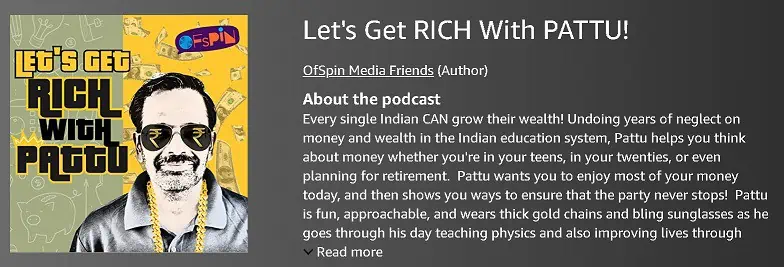

- Do you have a comment about the above article? Reach out to us on Twitter: @freefincal or @pattufreefincal
- Have a question? Subscribe to our newsletter using the form below.
- Hit 'reply' to any email from us! We do not offer personalised investment advice. We can write a detailed article without mentioning your name if you have a generic question.
Join 32,000+ readers and get free money management solutions delivered to your inbox! Subscribe to get posts via email! (Link takes you to our email sign-up form)
About The Author
 Dr M. Pattabiraman (PhD) is the founder, managing editor and primary author of freefincal. He is an associate professor at the Indian Institute of Technology, Madras. He has over 13 years of experience publishing news analysis, research and financial product development. Connect with him via Twitter(X), LinkedIn, or YouTube. Pattabiraman has co-authored three print books: (1) You can be rich too with goal-based investing (CNBC TV18) for DIY investors. (2) Gamechanger for young earners. (3) Chinchu Gets a Superpower! for kids. He has also written seven other free e-books on various money management topics. He is a patron and co-founder of “Fee-only India,” an organisation promoting unbiased, commission-free, AUM-independent investment advice.
Dr M. Pattabiraman (PhD) is the founder, managing editor and primary author of freefincal. He is an associate professor at the Indian Institute of Technology, Madras. He has over 13 years of experience publishing news analysis, research and financial product development. Connect with him via Twitter(X), LinkedIn, or YouTube. Pattabiraman has co-authored three print books: (1) You can be rich too with goal-based investing (CNBC TV18) for DIY investors. (2) Gamechanger for young earners. (3) Chinchu Gets a Superpower! for kids. He has also written seven other free e-books on various money management topics. He is a patron and co-founder of “Fee-only India,” an organisation promoting unbiased, commission-free, AUM-independent investment advice.Our flagship course! Learn to manage your portfolio like a pro to achieve your goals regardless of market conditions! ⇐ More than 3,500 investors and advisors are part of our exclusive community! Get clarity on how to plan for your goals and achieve the necessary corpus no matter the market condition!! Watch the first lecture for free! One-time payment! No recurring fees! Life-long access to videos! Reduce fear, uncertainty and doubt while investing! Learn how to plan for your goals before and after retirement with confidence.
Increase your income by getting people to pay for your skills! ⇐ More than 800 salaried employees, entrepreneurs and financial advisors are part of our exclusive community! Learn how to get people to pay for your skills! Whether you are a professional or small business owner seeking more clients through online visibility, or a salaried individual looking for a side income or passive income, we will show you how to achieve this by showcasing your skills and building a community that trusts and pays you. (watch 1st lecture for free). One-time payment! No recurring fees! Life-long access to videos!
Our book for kids: “Chinchu Gets a Superpower!” is now available!


Must-read book even for adults! This is something that every parent should teach their kids right from their young age. The importance of money management and decision making based on their wants and needs. Very nicely written in simple terms. - Arun.Buy the book: Chinchu gets a superpower for your child!
How to profit from content writing: Our new ebook is for those interested in getting a side income via content writing. It is available at a 50% discount for Rs. 500 only!
Do you want to check if the market is overvalued or undervalued? Use our market valuation tool (it will work with any index!), or get the Tactical Buy/Sell timing tool!
We publish monthly mutual fund screeners and momentum, low-volatility stock screeners.
About freefincal & its content policy. Freefincal is a News Media organisation dedicated to providing original analysis, reports, reviews and insights on mutual funds, stocks, investing, retirement and personal finance developments. We do so without conflict of interest and bias. Follow us on Google News. Freefincal serves more than three million readers a year (5 million page views) with articles based only on factual information and detailed analysis by its authors. All statements made will be verified with credible and knowledgeable sources before publication. Freefincal does not publish paid articles, promotions, PR, satire or opinions without data. All opinions will be inferences backed by verifiable, reproducible evidence/data. Contact Information: To get in touch, please use our contact form. (Sponsored posts or paid collaborations will not be entertained.)
Connect with us on social media
- Twitter @freefincal
- Subscribe to our YouTube Videos
- Posts feed via Feedburner.
Our publications
You Can Be Rich Too with Goal-Based Investing
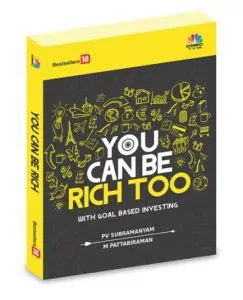 Published by CNBC TV18, this book is designed to help you ask the right questions and find the correct answers. Additionally, it comes with nine online calculators, allowing you to create custom solutions tailored to your lifestyle. Get it now.
Published by CNBC TV18, this book is designed to help you ask the right questions and find the correct answers. Additionally, it comes with nine online calculators, allowing you to create custom solutions tailored to your lifestyle. Get it now.Gamechanger: Forget Startups, Join Corporate & Still Live the Rich Life You Want
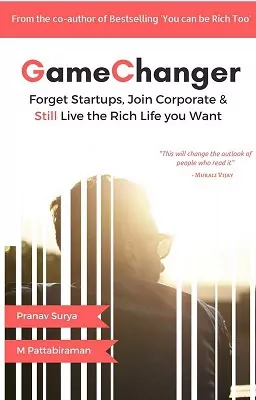 This book is designed for young earners to get their basics right from the start! It will also help you travel to exotic places at a low cost! Get it or gift it to a young earner.
This book is designed for young earners to get their basics right from the start! It will also help you travel to exotic places at a low cost! Get it or gift it to a young earner.Your Ultimate Guide to Travel
 This is an in-depth exploration of vacation planning, including finding affordable flights, budget accommodations, and practical travel tips. It also examines the benefits of travelling slowly, both financially and psychologically, with links to relevant web pages and guidance at every step. Get the PDF for Rs 300 (instant download)
This is an in-depth exploration of vacation planning, including finding affordable flights, budget accommodations, and practical travel tips. It also examines the benefits of travelling slowly, both financially and psychologically, with links to relevant web pages and guidance at every step. Get the PDF for Rs 300 (instant download)